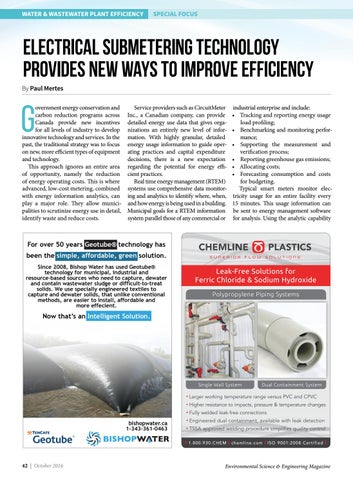WATER & WASTEWATER PLANT EFFICIENCY
SPECIAL FOCUS
Electrical submetering technology provides new ways to improve efficiency By Paul Mertes
G
overnment energy conservation and carbon reduction programs across Canada provide new incentives for all levels of industry to develop innovative technology and services. In the past, the traditional strategy was to focus on new, more efficient types of equipment and technology. This approach ignores an entire area of opportunity, namely the reduction of energy operating costs. This is where advanced, low-cost metering, combined with energy information analytics, can play a major role. They allow municipalities to scrutinize energy use in detail, identify waste and reduce costs.
42 | October 2016
Service providers such as CircuitMeter Inc., a Canadian company, can provide detailed energy use data that gives organizations an entirely new level of information. With highly granular, detailed energy usage information to guide operating practices and capital expenditure decisions, there is a new expectation regarding the potential for energy efficient practices. Real time energy management (RTEM) systems use comprehensive data monitoring and analytics to identify where, when, and how energy is being used in a building. Municipal goals for a RTEM information system parallel those of any commercial or
industrial enterprise and include: • Tracking and reporting energy usage load profiling; • Benchmarking and monitoring performance; • Supporting the measurement and verification process; • Reporting greenhouse gas emissions; • Allocating costs; • Forecasting consumption and costs for budgeting. Typical smart meters monitor electricity usage for an entire facility every 15 minutes. This usage information can be sent to energy management software for analysis. Using the analytic capability
Environmental Science & Engineering Magazine
